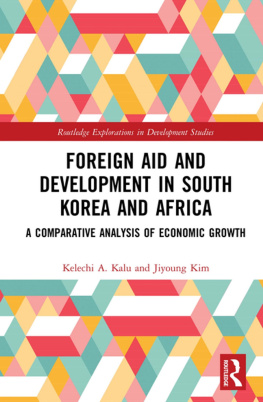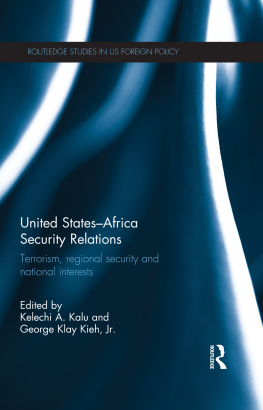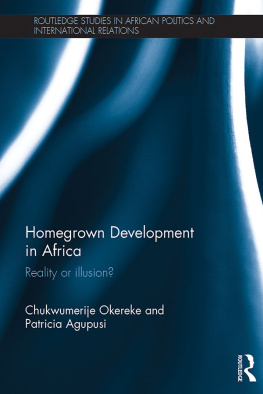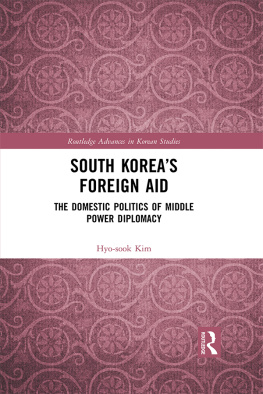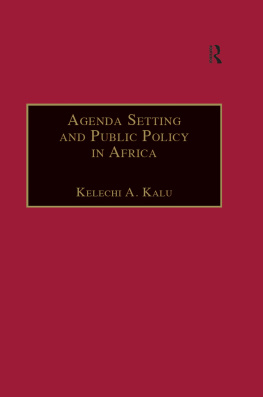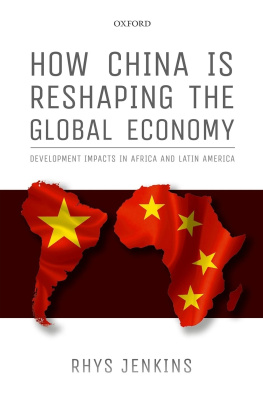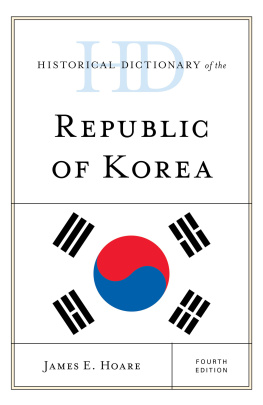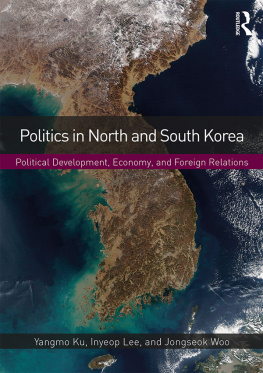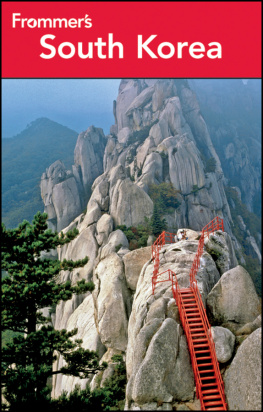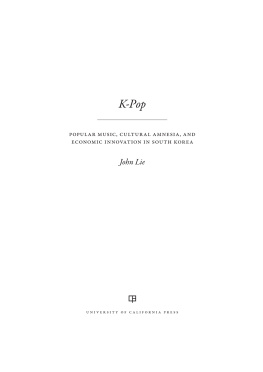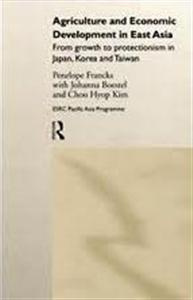Foreign Aid and Development in South Korea and Africa
This book compares the rapid development of South Korea over the past 70 years with selected countries in sub-Saharan Africa to assess what factors contributed to the countrys success story, and why it is that countries that were comparable in the past continue to experience challenges in achieving and sustaining economic growth.
In the 1950s, South Koreas GDP per capita was $876, roughly comparable with that of Cote dIvoire and somewhat below Ghanas. The countrys subsequent transformation from a war-ravaged, international aid-dependent economy to the 13th largest economy in the world has been the focus of considerable international admiration and attention. But how was it that South Korea succeeded in multiplying its GDP per capita by a factor of 23, while other Less Developed Countries continue to experience challenges? This book compares South Koreas politics of development and foreign assistance with that of Ghana, Nigeria, and Zambia, which were also major recipients of the U.S. aid, to investigate the specific contexts that made it possible for South Korea to achieve success. Overall, this book argues that effective state capacity in South Koreas domestic and international politics provided an anchor for diplomatic engagement with donors and guided domestic political actors in the effective use of aid for economic development.
This book will be of interest to researchers and students working on development, comparative political economy, and foreign aid, and to policy makers and practitioners looking for a greater understanding of comparative development trajectories.
Kelechi A. Kalu is the Founding Vice Provost of International Affairs and Professor of Political Science at The University of California, Riverside, U.S.A. He serves on the Board of Governors for the Congo Basin Institute and as a YALI Ghana Regional Center Global Ambassador.
Jiyoung Kim is Associate Professor in the Department of Political Science and International Relations at Soongsil University in Seoul, South Korea. She serves on the Advisory Committee for Korean Association of International Cooperation Agency (KOICA), Ministry of Foreign Affairs of Republic of Korea.
Routledge Explorations in Development Studies
This Development Studies series features innovative and original research at the regional and global scale. It promotes interdisciplinary scholarly works drawing on a wide spectrum of subject areas, in particular politics, health, economics, rural and urban studies, sociology, environment, anthropology, and conflict studies.
Topics of particular interest are globalization; emerging powers; children and youth; cities; education; media and communication; technology development; and climate change.
In terms of theory and method, rather than basing itself on any orthodoxy, the series draws broadly on the tool kit of the social sciences in general, emphasizing comparison, the analysis of the structure and processes, and the application of qualitative and quantitative methods.
Philanthropic Foundations in International Development
Rockefeller, Ford and Gates
Patrick Kilby
Foreign Aid and Development in South Korea and Africa
A Comparative Analysis of Economic Growth
Kelechi A. Kalu and Jiyoung Kim
Women and the UN
A New History of Womens International Human Rights
Edited by Rebecca Adami and Dan Plesch
Youth Civic Engagement and Local Peacebuilding in the Middle East and North Africa
Prospects and Challenges for Community Development
Edited by Ibrahim Natil
For more information about this series, please visit: www.routledge.com/Routledge-Explorations-in-Development-Studies/book-series/REDS
First published 2022
by Routledge
2 Park Square, Milton Park, Abingdon, Oxon OX14 4RN
and by Routledge
605 Third Avenue, New York, NY 10158
Routledge is an imprint of the Taylor & Francis Group, an informa business
2022 Kelechi A. Kalu and Jiyoung Kim
The right of Kelechi A. Kalu and Jiyoung Kim to be identified as authors of this work has been asserted by them in accordance with sections 77 and 78 of the Copyright, Designs and Patents Act 1988.
All rights reserved. No part of this book may be reprinted or reproduced or utilised in any form or by any electronic, mechanical, or other means, now known or hereafter invented, including photocopying and recording, or in any information storage or retrieval system, without permission in writing from the publishers.
Trademark notice: Product or corporate names may be trademarks or registered trademarks, and are used only for identification and explanation without intent to infringe.
British Library Cataloguing-in-Publication Data
A catalogue record for this book is available from the British Library
Library of Congress Cataloging-in-Publication Data
Names: Kalu, Kelechi Amihe, author. | Kim, Jiyoung (Professor of political science), author.
Title: Foreign aid and development in South Korea and Africa : a comparative analysis of economic growth / Kelechi A. Kalu and Jiyoung Kim.
Description: Abingdon, Oxon ; New York, NY : Routledge, 2021. | Series: Routledge explorations in development studies | Includes bibliographical references and index. |
Identifiers: LCCN 2021005763 (print) | LCCN 2021005764 (ebook) | ISBN 9780367752125 (hardback) | ISBN 9780367752132 (paperback) | ISBN 9781003161516 (ebook)
Subjects: LCSH: Economic assistanceKorea (South)History. | Economic assistanceAfricaHistory. | Economic developmentKorea (South)History. | Economic developmentAfricaHistory.
Classification: LCC HC467.756 .K35 2021 (print) | LCC HC467.756 (ebook) | DDC 338.91095195dc23
LC record available at https://lccn.loc.gov/2021005763
LC ebook record available at https://lccn.loc.gov/2021005764
ISBN: 978-0-367-75212-5 (hbk)
ISBN: 978-0-367-75213-2 (pbk)
ISBN: 978-1-003-16151-6 (ebk)
DOI: 10.4324/9781003161516
Typeset in Bembo
by codeMantra
DOI: 10.4324/9781003161516-1
Introduction
It is not often that an international event and economic development outcome generate as much attention and admiration as the South Korea has become a template for national transition from economic poverty to wealth, an enviable prototype for how a State can reinvent itself from near irrelevance to international respectability. History bears the record of South Koreas successful hosting of the 1988 Summer Olympic Games in Seoul, the 2002 Soccer World Cup, the 2010 G-20 Seoul Economic Summit, the 2011 High Level Forum on Aid Effectiveness in Busan, and the 2018 Winter Olympic Games in PyeongChang. Beyond its international sports hosting prowess, South Korea is also the 13th largest economy in the world, and in 2018, it became the ninth country in the world to have accomplished the economic feat of hitting a trade volume of $1 trillion!
These economic achievements of South Korea are remarkable for several reasons, two of which are its GDP per capita and its international trade numbers. On GDP, South Korea has a prominent lead in comparison with the economic growth of some African countries that it once shared similar economic realities with. For instance, in 1950, Gross Domestic Product (GDP) per capita for Ghana was $1,193 while South Koreas was $876, that of Cote dIvoire was $859, and Nigerias was $547. By 2010, GDP per capita for Ghana was $1,287, that of Cote dIvoire was $1,056, Nigerias was $1,224, while nominal On the second indicator of international trade, South Koreas accomplishment in its rate of trade growth also shines brightly when set against those of eight advanced economies that have also achieved over $1 trillion in international trade:

